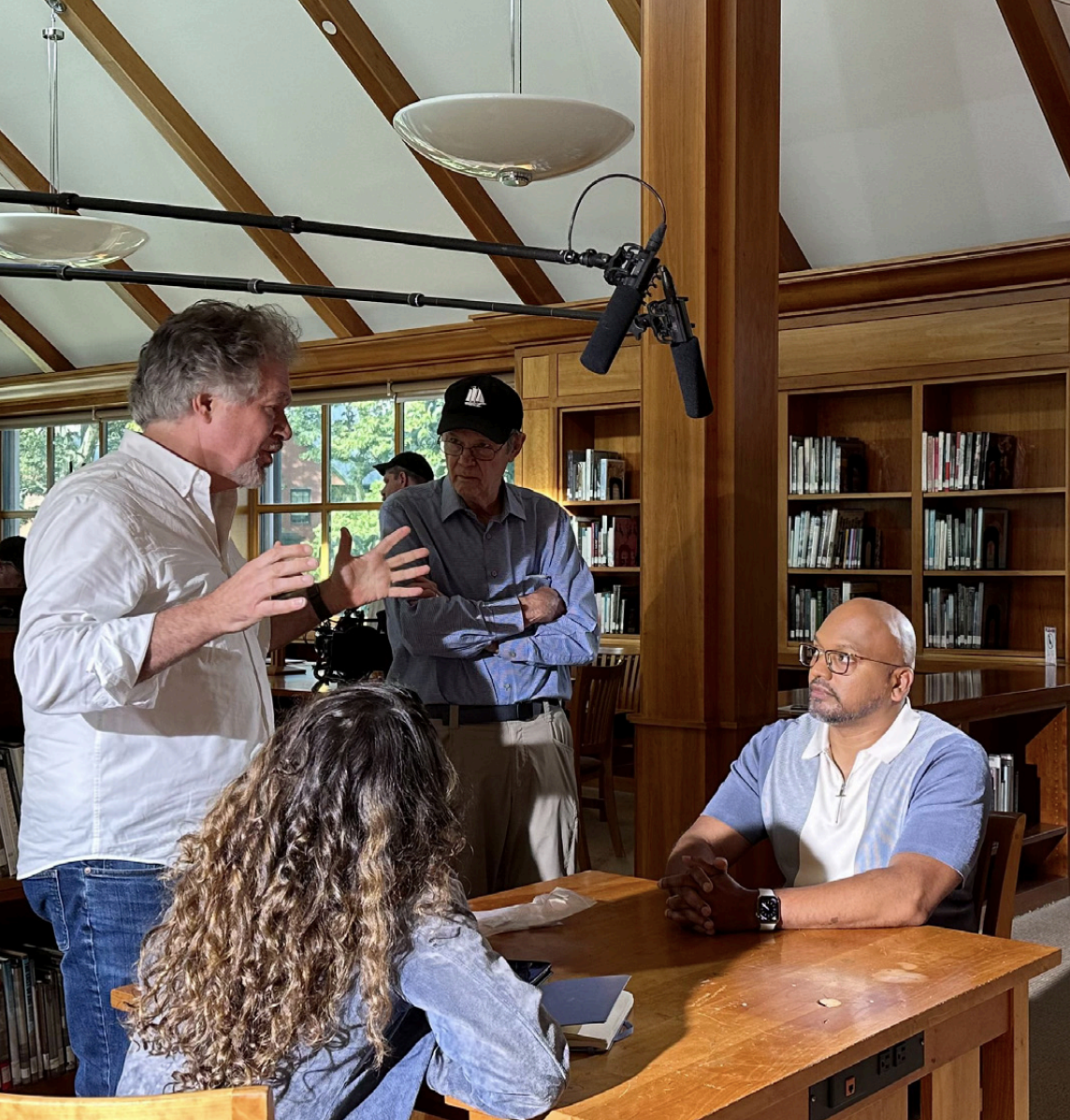Thursday, April 24
Zaheer Ali Interviewed for PBS Documentary
Jenny Zhao '25 (Features Editor, 144th Board) in Features | October 27, 2023

Lawrenceville’s commitment to social justice and its vibrant landscape is once again being featured on the big screen. Partially filmed on the School’s picturesque campus, the yet-to-be-named documentary, which highlights Islamic tradition, features Zaheer Ali, the Executive Director of Lawrenceville's Hutchins Institute for Social Justice.
A distinguished scholar and teacher, Ali leads the institute in spearheading advancements in social justice through teaching, programming, and experiential learning. Ali proactively guides students in the Hutchins Scholars in Social Justice program and coordinates the School’s annual Martin Luther King Jr. observance day to spread social justice principles. Ali’s specific area of scholarship lies in the study of Malcolm X. While completing his doctorate at Columbia University, he served as a lead researcher in the completion of the Pulitzer Prize-winning book Malcolm X: A Life of Reinvention. Through this opportunity, Ali has been asked to participate in television programs about Malcolm X that were featured on both CNN and Netflix. Ali also teaches the V Form Interdisciplinary course “Martin Luther King Jr. and Malcolm X.”
The new documentary, featuring Lawrenceville’s campus, is a project for Public Broadcasting Service (PBS) that will “look at different love stories in the Islamic tradition,” according to Ali. Contrary to the popular understanding of love, however, the film covers not just romantic love but a more broad understanding of the concept. Ali specifically focused on the idea of radical love. Intersecting with the popular Lawrenceville V Form English elective “Radical Love in African American Literature,” taught by Victoria Stitt, Ali’s segment revolved around his idea that “the history of racism in America has worked to undermine family bonds between Black people…the institutions of Black people…[and] Black self-love.” The love between two Black people in the U.S. is “not just a sentimental [or] emotional act,” but “absolutely a radical political act,” Ali added. Ali emphasized the idea of radicalism and disrupting and challenging “systems that are at the heart of producing harm in communities.” Demonstrated by the interactions “between Malcolm X and his half-sister Ella Collins,” Ali focused on “what their relationship tells us about love.” As a whole, Ali said that the documentary will also examine other historic love stories in Islam and “the different ways love has been expressed in Islam as a value.”
While outlining the filming process, Ali explained that the PBS crew reached out to him during the previous year and had an “informational discussion” where he explained his thoughts “on their different angles” and “gave them [his] ideas.” A few months later, Ali was contacted again and conducted a “talking head”-style interview in the PBS studio. Based on this meeting, the PBS team wanted to further emphasize Ali’s feature in the documentary by using Lawrenceville as a “cinematic setting.” On campus, Ali helped the team identify the Reynolds Fine Arts Reading Room in the Bunn Library as the primary location for filming. The current Hutchins Scholars in Social Justice were then given the opportunity to act as extras to make the segment seem more enticing “from a film storytelling perspective,” Ali said. The PBS staff took images of iconic Lawrenceville buildings such as the School’s historic Fathers’ Hall. From simply “walking past the Hutchins Center rotunda” to giving “bite-friendly answers” to interview prompts, Ali was immersed in the full set of Hollywood-style filming as well.
The documentary will not only highlight Ali’s personal knowledge in the subject but also Lawrenceville’s dynamic integration of academia and social justice. Set to air in the latter half of 2024, everyone involved in the film’s production has high hopes for the piece.
Related Articles
- A Sweet Return: Melba Reopens with New Flavors and Community Spirit Ella Song ’27
- The Clock’s Ticking: A Rush to Sort Out Scheduling Conflicts Bella Wu ’28
- Debunking the Dining Hall Debate: Is Lawrenceville’s Dining Really That Bad? Isabelle Lee ’27
- Senior Profile: Sophie Cheng ’25 Katherine Qiu ’27
- Dear Pearl: The Reveal! Pearl ... and Riley McKibben ’25
Recent Articles
- Announcing: Valedictorian, Aurelian Speakers, and Faculty Speaker Sophie Liu ’27
- Senior Profile: Sophie Cheng ’25 Katherine Qiu ’27
- Debunking the Dining Hall Debate: Is Lawrenceville’s Dining Really That Bad? Isabelle Lee ’27
- Welcoming Our New VPs for 2025-2026 Sophie Liu ’27
- A Sweet Return: Melba Reopens with New Flavors and Community Spirit Ella Song ’27